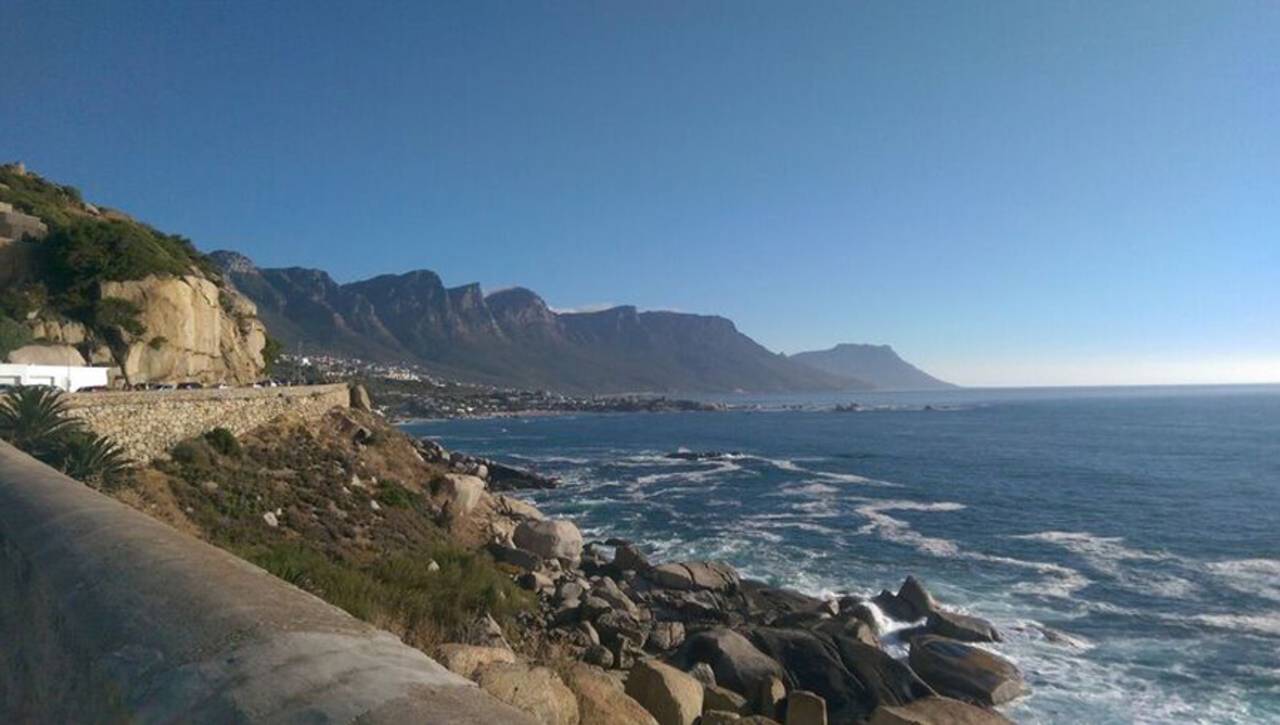Jozi v CPT: let the fur fly
What do Capetonians think about Johannesburg? Our correspondent finds himself listening in on some harsh opinions

The beautiful shoreline at Clifton, a suburb of Cape Town • Andrew Fernando/ESPNcricinfo
The check-in queue for the domestic flight from Johannesburg to Port Elizabeth is long and endearingly chaotic. There are glum faces, checking and re-checking of phones, facepalms, and barely contained rage, while the airline staff chit-chat, joke around and playfully hit each other like this is some high-school hallway. I feel like I'm back in Colombo.
Port Elizabeth seems like a town out of 1970s California, with its palm-lined seaside promenade, quirky hotels in pastel shades, and holiday-makers rocking up to the beach with their tents.
I wind up chatting to one of the St George's Park security guards while I wait to film a few of the Sri Lankan players for a video story. He follows the South Africa team closely, but doesn't know much about Sri Lankan cricket. He asks me how I think Sri Lanka will do.
South African slang is superbly evocative, and I pick a few titbits up:

The second stoush of the trip is so much better than the first. I'm having dinner with a few other journalists at a brewery when suddenly a man smashes his beer bottle on the ground and goes after someone else in his group. Friends immediately intervene to keep the aggressor from his target, and the women in the group begin shouting: "Corm darn, James. Corm daarn."
I go for a run for the first time in at least a year, taking the seafront route along the promenade. When I make it to the Port Elizabeth pier, I'm rewarded with a captivating view of the town and the surrounding coastline.
Squeezed between the frigid cobalt of the Atlantic and the grand, forbidding Table Mountain, Cape Town is one of the most stunning cities in the world, and boy, does it know it. I am staying in the prosperous Sea Point neighbourhood, where Audis and BMWs stud the spick-and-span streets, yoga is rampantly practised, inexpensive coffee is snootily scorned, and good wine copiously consumed.
The big story on Kyle Abbott's defection to Hampshire is breaking on ESPNcricinfo. Other papers have followed up and it is clear now that the great Kolpakalypse is about to hit. Over the next 48 hours there will be many thousands of words to write, several press conferences to attend, administrators to drill, players to question, and analysis stories to bash out. The press box is bracing fearfully. Journalists are asking each other what they know. Coffee is being hoarded. Requests for thoughts and prayers from loved ones are sent out.
The match is long over and the stadium is mostly empty, when Abbott is seen decamping to a corporate balcony adjoining the press box. He is sitting there, having a beer, when suddenly, on the other side of the ground, four young women strip down to their underwear and begin to frolic around on the pitch. There is a group of men - perhaps their boyfriends - watching the women, but Abbott is undaunted. He shouts to them. He waves. He pleads with them to come over to his side of the field - as if he hasn't taken enough from this country already.
At a Cape Town farmers' market, near a table of beautifully gnarled organic pumpkins, two former Johannesburgers are bashing their old city.

So far, South Africa has seemed a little like the remains of what was once a magic show. The streets are beautifully planned, and the public spaces and infrastructure are comparable to what is found in Australia or New Zealand. People drive good cars and live in fine houses. But you feel that perhaps you are not seeing the internal machinations of this production.
If you thought Capetonians were rough on Johannesburg, you should hear what Joburgers think of Cape Town. I have arrived at the final city of the Test series, and I'm at a birthday dinner for a South African journalist. As soon as Cape Town is brought up in conversation, several Joburgers unite to launch an unrelenting attack.
Taxi drivers have been wonderfully friendly in each of the three cities, but nowhere have they been as garrulous as in Johannesburg. Here they seem to be from all over this side of Africa. I meet Mozambicans, Somalis and DR Congolese, but mostly Zimbabweans. It is a Zimbabwean long-time resident of Johannesburg who gives me my most memorable ride. From the moment he picks me up, he pours forth non-stop about the problems with crime in the city, going at least 20 minutes without taking a breath.
Johannesburg has recently begun to use three-wheelers, and I manage to photograph one coming up Corlett Drive, next to the ground. I'm almost tempted to hail him and climb in, but the driver doesn't seem like the sort who would take his vehicle shooting across traffic at busy intersections, or the kind to lavishly berate other people's driving while leaping haphazardly between lanes and running small children over, so it wouldn't have felt enough like home for me.
The Sri Lanka team, lovely fellows, have given us a couple of days off, and I spend what would have been the fifth day at the Apartheid Museum, near Soweto. Some sections - like the short documentary on the political ructions of the 1980s and early '90s - make for especially sombre viewing, while beautiful photographs from the second half of the 20th century give the visitor an idea of the conditions that led to the creation, and later the downfall, of the system. The exhibits are thoughtfully presented; you enter through different doors based on the race your ticket has randomly assigned you.
Andrew Fidel Fernando is ESPNcricinfo's Sri Lanka correspondent. @andrewffernando